|
|
|
Sort Order |
|
|
|
Items / Page
|
|
|
|
|
|
|
| Srl | Item |
| 1 |
ID:
113961
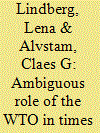

|
|
|
|
|
| Publication |
2012.
|
| Summary/Abstract |
The world trading system is characterized by a growing number of free trade agreements (FTAs). Limited progress in the negotiations at the multilateral level within the WTO has contributed to this development, inducing countries to seek faster, alternative ways to speed up liberalization, which make it possible to take advantage of preferential treatment with key trading partners. This article discusses what role the WTO should take with regard to FTAs in times of stalled multilateral negotiations and proliferating FTAs, and how FTAs can contribute to the multilateralization of regionalism. When results at the multilateral level are scarce, there may be a shift towards other alternatives in which the WTO is left out. This may force the WTO to function reactively, simply facing facts as an organization, rather than proactively, where it may play some role in shaping the FTA development. FTAs are not an entirely separate phenomenon from the WTO, since countries that negotiate FTAs play two roles. They are members of the WTO and as such are part of the work and negotiations of the organization. They are also part of trade arrangements that are limited to a smaller number of countries, and hence can negotiate against the interest of the entire multilateral organization. This article explores how these agreements can facilitate the work and negotiations of the WTO to regionalize bilateralism and multilateralize regionalism, here named the "sticky rice" approach. Various East Asian trade arrangements are used as empirical examples.
|
|
|
|
|
|
|
|
|
|
|
|
|
|
|
|
| 2 |
ID:
113959
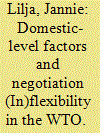

|
|
|
|
|
| Publication |
2012.
|
| Summary/Abstract |
Some suggest that the fault lines of the WTO's perceived failures actually lie in failures at the domestic level. This study examines the factors that can explain flexibility (and inflexibility) in multilateral trade negotiations within WTO member states. To shed light on the role of domestic factors in influencing WTO positions, we examine one member state in connection with a high-level meeting. India at the July 2008 Ministerial is selected primarily for methodological reasons. The empirical analysis provides preliminary support for the proposition that domestic policy-making structures marked by continuous information exchange and coordination are more likely to yield negotiation flexibility in multilateral talks. More specifically, the intense interaction that marks the relationships between actors involved in policy making on Non-Agricultural Market Access (NAMA) and services, where the Indian negotiation position was flexible overall, stands in contrast to what took place in the area of agriculture, where India took a manifestly inflexible stand. Competing explanations fail to fully account for the variation in these negotiating postures. A key insight from the analysis is that organized and regularized consultations, involving the same actors over time, are important. There is also a need for public outreach strategies in connection with high-level WTO meetings.
|
|
|
|
|
|
|
|
|
|
|
|
|
|
|
|
| 3 |
ID:
113954
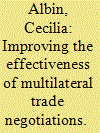

|
|
|
|
|
| Publication |
2012.
|
| Summary/Abstract |
This special issue of International Negotiation explores from different perspectives how multilateral trade negotiations, primarily within the World Trade Organization (WTO), can become more effective. The challenges associated with this task have grown, as the parties and issues involved in such talks have increased in number and diversity. The specific topics addressed include the role of non-governmental organizations (NGOs) and domestic-level factors, agenda management, legitimacy and procedural issues, turning points, the challenge posed by the pursuit of bilateral and regional alternatives, and the question of gains to be had from multilateralism. The conclusions drawn from these studies are wide-ranging and relevant for multilateral negotiations generally. They highlight, among other matters, the significance of decision-making procedures used in the negotiation process.
|
|
|
|
|
|
|
|
|
|
|
|
|
|
|
|
| 4 |
ID:
113957
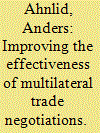

|
|
|
|
|
| Publication |
2012.
|
| Summary/Abstract |
The informal WTO ministerial meeting in July 2008 brought the long stalled Doha Round to the verge of a breakthrough. The reason for its final failure was substantive and not related to the negotiating procedures, which previously had contributed to meager results and failures in the round. The meeting was conducted using procedures that ensured a considerable amount of trustworthiness, transparency and legitimacy, which in turn contributed to effectiveness in the process. Thus, the meeting solved many, albeit not all, outstanding issues on the path towards agreement on so-called modalities for agriculture and industrial products, which in turn would have been necessary for a final successful conclusion of the Round. The 2008 July negotiations demonstrated that complex large-scale multilateral negotiations can be handled procedurally in an acceptable and successful way. The article advances a neglected interpretation of the July meeting, and provides lessons for both future WTO negotiations and multilateral negotiations in other policy areas.
|
|
|
|
|
|
|
|
|
|
|
|
|
|
|
|
| 5 |
ID:
113958


|
|
|
|
|
| Publication |
2012.
|
| Summary/Abstract |
Non-governmental organizations (NGOs) have remained outside all the GATT rounds since the 1950s. In contrast, hundreds of NGOs have taken part in the current WTO round. This article maps the formal participation of NGOs in five ministerial conferences during the Doha round. It also analyzes various forms of NGO involvement in the WTO trade talks, such as lobbying and capacity-building of developing countries. An assessment of the current and potential capacities of NGOs in the Doha round requires that their performance be seen from an explicit negotiation perspective. Both NGO participation and involvement, as well the interaction between these two forms of NGO performance need to be considered. An assessment of how NGOs may have an impact on negotiation effectiveness and efficiency in WTO rounds should be approached from a long-term perspective and should consider other kinds of outcomes than formal final agreements. NGO performance in WTO may increase the complexity of negotiations or the significance of non-trade issues. NGO activities outside the WTO may disturb multilateral trade negotiations in the short term, such as during ongoing Ministerial Conferences. On the other hand, NGOs may also help to pave the way for constructive long-term changes in the WTO regime, which, in turn, may have a favorable impact on the effectiveness and efficiency of the overall WTO negotiation system.
|
|
|
|
|
|
|
|
|
|
|
|
|
|
|
|
| 6 |
ID:
113956


|
|
|
|
|
| Publication |
2012.
|
| Summary/Abstract |
How does the agenda management process influence the effectiveness of multilateral trade talks in the World Trade Organization (WTO)? How can the all-important agenda be shaped so as to enhance the prospects of an agreement being reached? How the agenda is managed directly affects the negotiation process which follows and the eventual outcome. Yet researchers have paid little attention to the particular dynamics and challenges of agenda management in large-scale multilateral negotiations, and actual practice points to several weaknesses. This article proposes that the complexity of the agenda in multilateral talks needs to be managed and reduced in procedurally just ways if a successful outcome (agreement) is to result. It develops an analytical framework of agenda management in multilateral negotiations and conducts a structured focused comparison to explain the differences in outcomes of two rounds of WTO negotiations: the failure of the 2003 Cancún Ministerial Conference and the success of the 2004 Geneva negotiations in reaching an agreement. The findings support the proposition that a successful outcome depends in part on reducing agenda complexity and that this needs to be achieved in procedurally acceptable (if not just) ways.
|
|
|
|
|
|
|
|
|
|
|
|
|
|
|
|
| 7 |
ID:
113960
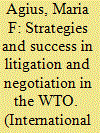

|
|
|
|
|
| Publication |
2012.
|
| Summary/Abstract |
This article analyzes linkages between litigation in the World Trade Organization (WTO) Dispute Settlement Body (DSB) and negotiation in multilateral trade rounds and develops a typology of links that can occur between the two processes. These include creating conditions where bargaining is informed by law, influencing the agenda-setting and creating momentum for negotiation on key issues, and affecting the status quo from which negotiations proceed by influencing interpretation of trade rules in the DSB. The purpose is to test whether poor and inexperienced states that are disadvantaged in negotiations can improve their bargaining power in negotiation rounds by pursuing legal proceedings, to see whether links can be exploited for strategy-making to promote the interests of these states, and to discuss how the WTO as an international organization benefits from their empowerment. The strategies suggested in this article could improve the commitment and active participation of relatively non-influential member states. This could be conducive to perceptions of the WTO as a legitimate organization and to a more constructive climate for effective negotiations.
|
|
|
|
|
|
|
|
|
|
|
|
|
|
|
|
| 8 |
ID:
113955


|
|
|
|
|
| Publication |
2012.
|
| Summary/Abstract |
Application of a turning points analysis to detailed chronologies of events that transpired prior to and during two matched cases of multilateral intellectual property rights (TRIPS) negotiations yields useful lessons for understanding negotiation process and effective negotiator behavior. The unfolding negotiation process is traced in the GATT Uruguay Round and prior to and during the WTO Doha Ministerial. Departures from earlier trends in the chronologies merit special attention. A departure is defined as a clear and self-evident change from earlier events or patterns in the form of an impactful decision taken by one or more parties. By coding the causes (precipitants) and effects (consequences) of the departures, we perform a turning points analysis. The turning points analysis, composed of three-part sequences, reveals the triggers and impacts of departures during the extended TRIPS negotiation process. The analyses will allow a comparison of the patterns that unfolded during the two phases of TRIPS negotiations, which will highlight the breakthroughs that occurred during the Uruguay Round and the crises that emerged later, prior to and during the Doha Ministerial. Improving the effectiveness of multilateral trade negotiations depends in part on understanding how critical turning points emerge.
|
|
|
|
|
|
|
|
|
|
|
|
|
|
|
|
| 9 |
ID:
113962


|
|
|
|
|
| Publication |
2012.
|
| Summary/Abstract |
The growth and resilience of world trade indicate that the original aim of the General Agreement on Tariffs and Trade (GATT) has been largely fulfilled. This success makes the economic interest of parties in the Doha Development Round (DDR) less clear. This article analyzes how countries express their interests in the Doha round, based on their reactions to the breakdown in Geneva in July 2008. A qualitative analysis of these reactions reveals that the interests of the actors differ considerably. Only a minority of the member countries express an interest in negotiations congruent with the Ricardian logic of the original mandate of GATT and the WTO. The interests of other parties seem to be furthered by stalling negotiations. An increasingly important dimension of the DDR is the negotiation and institutionalization of norms, but this dimension hitherto has not been overtly handled. Unless they are productively dealt with, this difference in actors' interests, and the opaque negotiation of norms, will decrease the effectiveness of the Doha negotiations.
|
|
|
|
|
|
|
|
|
|
|
|
|
|
|
|
|
|
|
|
|